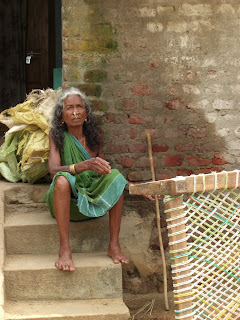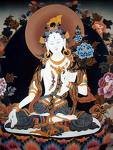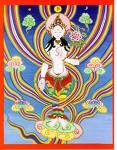


Hmmmm….. How can I describe the despair of delirium and fever when you are isolated in the middle of rice paddies, no reliable medical services for at least 5 tortuous hours in a jeep, no one who speaks English to understand why you’re sobbing, and of course you’re in the tropics and have a medical education so the differential diagnosis running through your clammy brain is … prodigous?
Finally Asha arrived, and was kind of shocked to find me in this state. I had just been in bed all day, so no one realized! She was fantastic and cared for me, forcing me to eat, drink tea, and doing molish (I guess it means massage, mostly it was just a pressing/rubbing on my sweaty skin) for a couple of days, until she took ill herself. Then her daughter caught it from her. I felt awful to have spread my contagion so far. They both have recovered fully, but Asha took Suni to the doctor. He gave her a couple of shots of who-knows-what and that cost her 100 Rs (about $2.50). It’s a lot for her.
When Asha couldn’t come, Chinnamuru (the cook), and Parathi, (the wife of the handyman) would show up 3 times a day, cluck over me in Telegu, make me eat a few bites, and do some molish on me. I can’t express how even though being touched felt kind of icky, it was mostly just profoundly healing. It was such an incredibly pure expression of concern and desire to do something to help. Thank goodness for the ladies.
People always think it’s ironic when “the doctor” is sick. I think it’s an important reminder for us, and helps renew our compassion. I know I’m feeling very compassionate right about now! It was interesting, in a way, to observe my own symptoms – fever, pain, weakness, anorexia, maybe a touch of delirium. I felt the illness leave my body pretty abruptly. One day I just could walk steady. Two days later I actually had an appetite. The first time I ate a decent meal, Asha glowed with pride (and some relief, I think).
Now that I’m feeling better, I’m ready to start preparing the teaching modules. I don’t think there will be any more field visits. :[ They’ve been really interesting. Sambamurthi asked me, “Madam, how was field today?” I told him “It was fun.” He nodded and said “Fine.” I had to clarify, “No not ‘fine’, it was ‘FUN.’” First he looked confused, then bemused. He's a very serious man, so it was nice to get a smile out of him.
Here are some last pictures from the field, and one of my Molish Team.
Songs for fever (sangitam oka jwaram): a dreamy mix of iron and wine, Dead Can Dance, Mazzy Star, Sufjan Stevens, Joshua Radin, Sia, Nick Drake.
P.S.
I want to send a shout out to everyone at the Petaluma Health Center. I miss you!
And a huge Happy Birthday to Sadie!! 8 pounds 8 ounces and a head full of hair. Jena, you're a star.












